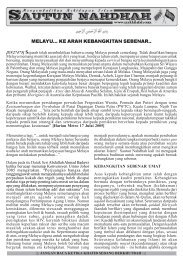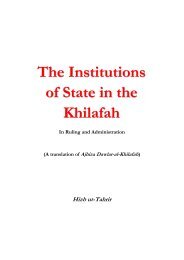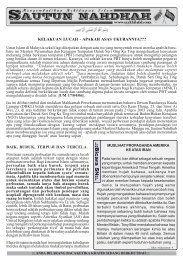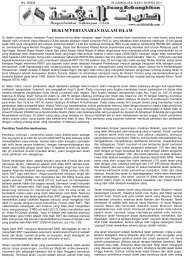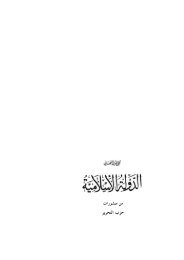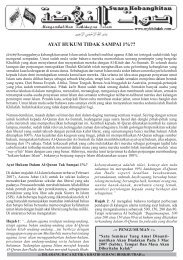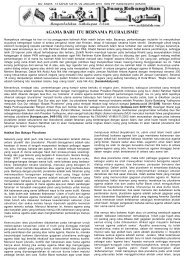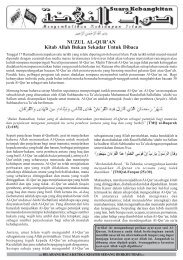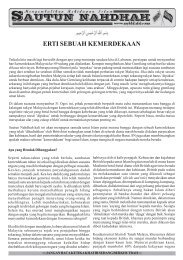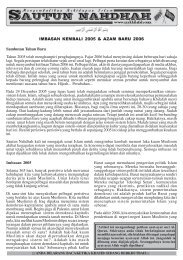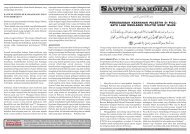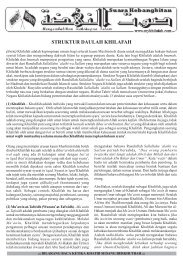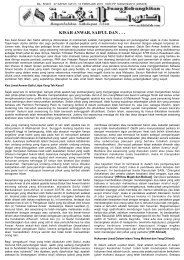A Warm Call from Hizb ut-Tahrir to the Muslims - MyKhilafah.com
A Warm Call from Hizb ut-Tahrir to the Muslims - MyKhilafah.com
A Warm Call from Hizb ut-Tahrir to the Muslims - MyKhilafah.com
You also want an ePaper? Increase the reach of your titles
YUMPU automatically turns print PDFs into web optimized ePapers that Google loves.
86 u A <strong>Warm</strong> <strong>Call</strong> <strong>from</strong> <strong>Hizb</strong> <strong>ut</strong>-<strong>Tahrir</strong> <strong>to</strong> <strong>the</strong> <strong>Muslims</strong><br />
thoughts relate <strong>to</strong> life's affairs or <strong>the</strong> organisation of <strong>the</strong> relationships.<br />
In o<strong>the</strong>r words, it is through <strong>the</strong> political work <strong>to</strong> establish <strong>the</strong> Islamic<br />
Khilafah via <strong>the</strong> dissemination of Islamic thoughts and <strong>the</strong> struggle in<br />
this path.<br />
That is because <strong>the</strong> people are ruled by an existing a<strong>ut</strong>hority that has<br />
been seized by rulers amongst <strong>the</strong>m or <strong>from</strong> o<strong>the</strong>rs. These rulers look<br />
after <strong>the</strong> affairs of <strong>the</strong>ir citizens with specific thoughts and laws. This<br />
caring for <strong>the</strong> affair is done for specific incidents with specific thoughts,<br />
i.e. specific problems are solved by specific sol<strong>ut</strong>ions. So <strong>the</strong>se incidents<br />
are tangible and perceptible and <strong>the</strong>ir sol<strong>ut</strong>ions are tangible and<br />
perceptible and <strong>the</strong>ir results in terms of providing <strong>the</strong> interest and<br />
maintaining it are also perceptible. All that is required of those working<br />
<strong>to</strong> establish <strong>the</strong> Islamic State on <strong>the</strong> ruins of this ruling system is that<br />
<strong>the</strong>y draw <strong>the</strong> people's attention <strong>to</strong> <strong>the</strong> corruption of <strong>the</strong>se sol<strong>ut</strong>ions, i.e.<br />
<strong>to</strong> <strong>the</strong> invalidity of <strong>the</strong> thoughts and rules with which <strong>the</strong>se incidents are<br />
treated. They also have <strong>to</strong> demonstrate that <strong>the</strong> correct sol<strong>ut</strong>ion for such<br />
incidents is a particular thought or a particular rule and that this is <strong>the</strong><br />
thought of Islam and <strong>the</strong> rule of Islam. So <strong>the</strong> Islamic thought or <strong>the</strong><br />
Islamic rule is applied <strong>to</strong> <strong>the</strong> current incident. Thus, <strong>the</strong> reality of <strong>the</strong><br />
rule is <strong>com</strong>prehended and its meaning is perceived, which <strong>the</strong>n provokes<br />
thinking and incites <strong>the</strong> emotions. As for demonstrating <strong>the</strong> invalidity of<br />
<strong>the</strong> thoughts and rules with which <strong>the</strong> rulers solve <strong>the</strong>se incidents, it is<br />
not correct <strong>to</strong> do this in terms of realising or not realising an interest.<br />
Ra<strong>the</strong>r <strong>the</strong> clarification should be in terms of <strong>the</strong>m being Kufr thoughts<br />
or Kufr rules. It is not correct that <strong>the</strong>ir invalidity is demonstrated by<br />
showing that <strong>the</strong>y do not achieve an interest or that harm arises <strong>from</strong> <strong>the</strong><br />
thoughts and rules or that <strong>the</strong>y do not preserve an interest or that <strong>the</strong>y<br />
waste an interest. Ra<strong>the</strong>r, <strong>the</strong>ir invalidity should be demonstrated by<br />
showing that <strong>the</strong>y are un-Islamic rules and that <strong>the</strong>y are rules of Kufr and<br />
that judging by <strong>the</strong>m is judging by Tagh<strong>ut</strong>. The invalidity that has <strong>to</strong> be<br />
demonstrated is that <strong>the</strong>y are thoughts and rules of Kufr, because <strong>the</strong><br />
issue is one of Kufr and Islam and not one of interest or harm. Similarly,<br />
when <strong>the</strong> correct sol<strong>ut</strong>ion is shown as such and such thought or rule<br />
and it is <strong>the</strong> thought or rule of Islam, it would not be correct <strong>to</strong> show its<br />
suitability and explain its correctness in terms of realising an interest<br />
or removing harm. Ra<strong>the</strong>r its correctness should be demonstrated and its<br />
suitability explained in terms of it being a Hukm Shar’i by bringing its<br />
Shar’i evidence <strong>from</strong> <strong>the</strong> Kitab and Sunnah, or <strong>from</strong> a principle deduced<br />
A <strong>Warm</strong> <strong>Call</strong> <strong>from</strong> <strong>Hizb</strong> <strong>ut</strong>-<strong>Tahrir</strong> <strong>to</strong> <strong>the</strong> <strong>Muslims</strong> u 87<br />
<strong>from</strong> <strong>the</strong> Kitab and Sunnah, or of it being a branch or a case <strong>from</strong> <strong>the</strong><br />
branches and cases of a Hukm Shar’i whose evidences are well known.<br />
This is <strong>the</strong> manner by which <strong>the</strong> invalidity of specific sol<strong>ut</strong>ions with<br />
which <strong>the</strong> rulers solve specific problems is shown and by which <strong>the</strong><br />
correctness and validity of <strong>the</strong> thoughts and rules of Islam are also<br />
shown. Thus <strong>the</strong> sol<strong>ut</strong>ion <strong>to</strong> current incidents should be directly linked<br />
<strong>to</strong> <strong>the</strong> Islamic ‘Aqeedah. So <strong>the</strong> Islamic ‘Aqeedah is taken as <strong>the</strong> only basis<br />
through which <strong>the</strong>se thoughts and rules are viewed. They are looked at<br />
<strong>from</strong> <strong>the</strong> perspective of Islam and Kufr and nothing else. For <strong>the</strong> rules in<br />
<strong>the</strong> world are ei<strong>the</strong>r rules of Islam or rules of Kufr, <strong>the</strong>re is no third<br />
category. It can also be said that <strong>the</strong> whole world is ei<strong>the</strong>r Dar al-Islam or<br />
Dar ul-Kufr, <strong>the</strong>re is no third category. Therefore <strong>the</strong> ref<strong>ut</strong>ation of<br />
thoughts and rules should be on this basis only, i.e. Islam or Kufr and<br />
nothing else whatsoever. So we should say abo<strong>ut</strong> a thought or rule that<br />
this is Kufr if it is Kufr, or this is Haram if it is Haram and <strong>the</strong> Shar’i<br />
evidence will show that it is Kufr and <strong>the</strong> Shar’i evidence will show that<br />
it is Haram. It must be explained <strong>to</strong> <strong>the</strong> people that <strong>the</strong> one who adopts<br />
an un-Islamic thought or rule will leave <strong>the</strong> fold of Islam, thus<br />
<strong>com</strong>mitting Kufr and apostasy if <strong>the</strong> thought or rule <strong>com</strong>es under <strong>the</strong><br />
orders of Allah pertaining <strong>to</strong> Iman, like <strong>the</strong> thought of separating religion<br />
<strong>from</strong> state or giving donations for <strong>the</strong> building of a church. He will be<br />
<strong>com</strong>mitting a sin and will be punished for it in <strong>the</strong> Hellfire if <strong>the</strong> thought<br />
or rule was <strong>from</strong> <strong>the</strong> orders of Allah that relate <strong>to</strong> actions and not <strong>to</strong><br />
Iman, such as <strong>the</strong> thought of nationalism or taking an interest based<br />
loan <strong>from</strong> <strong>the</strong> bank. Thus, <strong>the</strong> basis of <strong>the</strong> thoughts and rules must be<br />
<strong>the</strong> Islamic ‘Aqeedah and <strong>the</strong>ir criteria should be Islam, Kufr, Halal and <strong>the</strong><br />
Haram. Accordingly, <strong>the</strong>ir falseness or correctness is judged on this basis<br />
and according <strong>to</strong> <strong>the</strong>se criteria.<br />
When attention is drawn <strong>to</strong> <strong>the</strong> corruption of <strong>the</strong> current sol<strong>ut</strong>ions, it<br />
is done so for <strong>the</strong> purpose of explaining <strong>the</strong> corruption of <strong>the</strong> existing<br />
society, i.e. <strong>the</strong> corruption of <strong>the</strong> existing relationships between people.<br />
Their corruption does not arise <strong>from</strong> <strong>the</strong> fact that <strong>the</strong>y realise an interest<br />
or prevent harm or <strong>the</strong> opposite. Ra<strong>the</strong>r it results <strong>from</strong> <strong>the</strong> corruption<br />
of <strong>the</strong> viewpoint abo<strong>ut</strong> life which controls <strong>the</strong>se relationships and <strong>from</strong><br />
which <strong>the</strong>se sol<strong>ut</strong>ions emanate. That is why we must link <strong>the</strong> sol<strong>ut</strong>ions<br />
with <strong>the</strong>ir basis and <strong>the</strong>ir error must be explained in terms of <strong>the</strong><br />
falseness of <strong>the</strong>ir basis and not in terms of <strong>the</strong> interest or harm. Thus<br />
1<br />
2<br />
3<br />
4<br />
5<br />
6<br />
7<br />
8<br />
9<br />
10<br />
11<br />
12<br />
13<br />
14<br />
15<br />
16<br />
17<br />
18<br />
19<br />
20<br />
21<br />
22<br />
23<br />
24<br />
25<br />
26<br />
27<br />
28<br />
29<br />
30<br />
31<br />
32<br />
33<br />
34<br />
35<br />
36<br />
37<br />
38<br />
39



